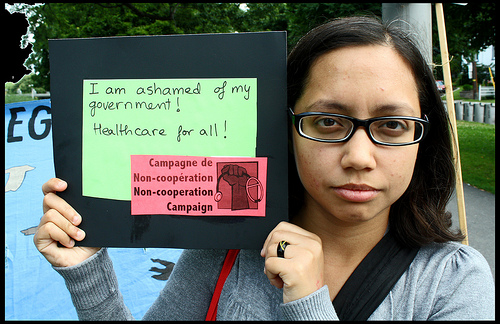It has been over a week since the cuts to the 55-year-old Interim Federal Health Program (IFHP) took effect, leaving refugees and refugee claimants without essential health care services and medication. These changes have affected children as well as seniors and adults, and have put the lives of vulnerable people in this country at risk.
In a bizarre petition thanking himself, the Minister of Citizenship and Immigration, Jason Kenney, has promoted these cuts as a matter of fairness and equality. He claims that the former program was unfair because it provided refugees and refugee claimants with benefits that some Canadian citizens were unfortunately not receiving.
By framing the issue in this way, Minister Kenney has misunderstood and misrepresented what equality means in Canada. Equality is not achieved by depriving others of what we should all have.
As the Supreme Court of Canada has recognized, equality in Canada means substantive equality. It is not enough to treat everyone the same way; an individual’s social, political, economic, and historical background must be taken into account when determining what is fair. For example, there is no substantive equality when an individual using a wheelchair is expected to take the same stairs that others use to enter a building. Similarly, there is no substantive equality when refugees and refugee claimants’ healthcare coverage does not reflect their unique vulnerabilities and backgrounds.
These cuts do not even satisfy Minister Kenney’s superficial understanding of equality as sameness. They arbitrarily create a class system among refugees and refugee claimants. For example, those that are part of the Refugee Assistance Program will be spared from the cuts, due to a last minute change by the government. In contrast, refugees who are not part of that program will see their benefits reduced to emergency coverage only.
Inequalities will also be created among refugee claimants. Claimants from countries deemed “safe” by the Minister will not even be covered unless their condition poses a public health concern – even in life or death situations.
If Minister Kenney’s objective is equality, he must ensure that the unique circumstances of refugees and refugee claimants are reflected in their health care coverage. The Canadian health care system already abides by the principle of substantive equality.
For example, many individuals receiving social assistance are given supplementary health care coverage. The system recognizes that they could not pay for a dentist or eye doctor through private healthcare plans or out of pocket, and should therefore be treated differently.
Equality allows and in some cases requires distinctions to be made. However, distinctions must be made for the right reasons. The recent cuts to refugee health care make distinctions for all the wrong reasons, and increase the vulnerability of an already disadvantaged group.
Nadia Sayed is a third year law student at the University of Toronto, and Kendall Yamagishi is a third year law student at York University.



